The report, authored by the RAND Corporation, focused on the six communities in the initiative funded by The Wallace Foundation and is designed to be useful to those carrying out SEL instruction in schools, out-of-school-time programs or both.
The report takes a closer look at a variety of topics related to SEL including:
- Implementing SEL and Why It Matters
- Launching and Coordinating SEL Work Across Multiple Sites
- Developing Partnerships with Schools to Advance SEL Efforts
- Developing Adults' Capacity to Promote SEL
- Improving Climate and Delivery of SEL for Youth
Ultimately, the report found several implications specifically for OST program leaders and staff looking to support the social and emotional development of children and youth:
- Site leaders need to be intentional about protecting time for SEL and conveying to staff the priority of delivering the intended SEL instruction.
- When adapting an evidence-based SEL curriculum to meet local needs, retain features that contribute to the curriculum's effectiveness.
- The integration of SEL instruction into academics and OST activities requires explicit guidance and resources, such as lesson plans and model activities.
- SEL coaches can provide valuable support to school and OST staff who are implementing new SEL programs and practices.
- Taking the time to meet, increasing the overlap of school and OST staff, and explicitly acknowledging the power differential that favors schools over OST programs are important ingredients for strong school-OST partnerships.
The report states that by building on the strengths of both schools and OST programs to develop a multi-pronged strategy for promoting SEL, the PSELI communities studied are putting into practice several of the tenets that SEL scholars and advocates have suggested are crucial for effective SEL. With the COVID-19 pandemic disrupting school and OST programming on an unprecedented level, it's more crucial than ever to address the social and emotional well-being and academic learning of the children and youth served.
RAND and The Wallace Foundation plan to release a later report in this series that will examine outcomes and the relationship between implementation and outcomes in addition to a how-to guide. The report's authors are also conducting in-depth case studies that will offer a more detailed picture of what PSELI work looks like on the ground and how it evolves over time. These future reports will revisit and build on the early lessons outlined in this first report.
To learn more about SEL implementation, supports, strategy and the report's additional findings, view the report in its entirety by clicking here.
Courtesy of NAA.
Photo courtesy of Allison Shelley for EDUimages.




